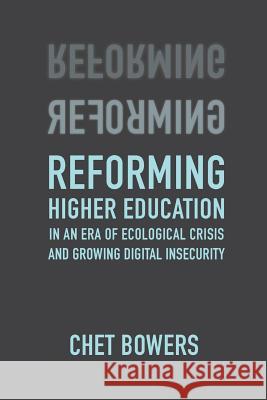Reforming Higher Education: In an Era of Ecological Crisis and Growing Digital Insecurity » książka
Reforming Higher Education: In an Era of Ecological Crisis and Growing Digital Insecurity
ISBN-13: 9781940447230 / Angielski / Miękka / 2016 / 184 str.
Chet Bowers wrote his first book on the connections between education, cultural ways of knowing, and the ecological crisis in 1974. Since then he has written more than 20 books that variously explore two concerns: how language reproduces ways of thinking that were formed before there was an awareness of ecological limits, and how the world's diverse cultural commons can serve as sites of resistance to economic globalization and further environmental degradation. In this book he focuses attention on the cultural and linguistic roots of the ecological crisis and claims that these have been ignored across the academic disciplines. He explores alternative pathways to living less consumer-dependent lives that have a smaller ecological footprint, and he asks critical questions about how the digital revolution is leading to the loss of important traditions such as democracy, privacy, and long-term memory. The book argues for a reform of higher education that promotes the formation of ecological intelligence by clarifying the colonizing effects of the West's penchant for print-based, abstract thinking, and showing how inherited vocabularies that reproduce the misconceptions and silences of earlier thinkers can be reframed by introducing students to culturally and environmentally informed analogs. Bowers argues that classroom teachers and university professors need to understand their role as mediators in helping students to recognize the ecological differences between their cultural commons and consumer-based experiences. His goal is nothing short of the transformation of culture through ecological thinking.











